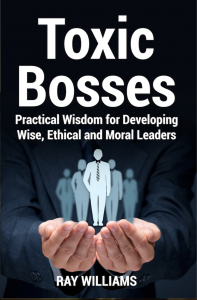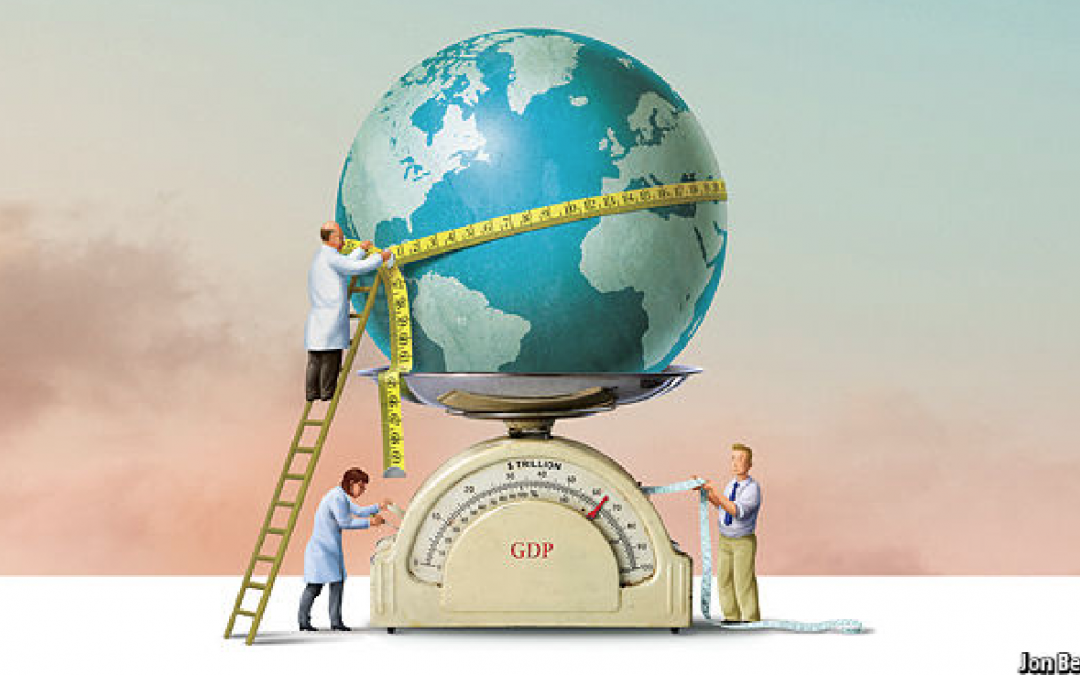By Ray Williams
June 13, 2021
What GDP is and What it Isn’t
GDP or Gross Domestic Product has been referred to by governments, economists and financial institutions as the standard measurement of a country’s economic well-being. However, many experts and observers now believe GDP is a poor measure of progress. They argue need a measure of progress that includes social and natural capital.
GDP or Gross Domestic Product has been defined by the Organization for Economic Cooperation and Development (OECD) defined as “an aggregate measure of production equal to the sum of the gross values added of all resident and institutional units engaged in production (plus any taxes, and minus any subsidies, on products not included in the value of their outputs).”
The International Monetary Fund (IMF) says that “GDP measures the monetary value of final goods and services—that are bought by the final user—produced in a country in a given period of time (say a quarter or a year).”

Image source: Visual Capitalist
The GDP measurement was created by American Economist Simon Smith Kuznets for a US Congress report in 1934. GDP was used on a regular basis beginning after the United Nations Monetary and Financial Conference in 1944 and has been used by countries worldwide since.
GDP is calculated in three ways: the production (output or value added), income, speculated expenditure.
GDP is not the same as gross national product (GNP) or, as it is now known, gross national income (GNI). GDP is product produced within a country’s borders; GNI is product produced by enterprises owned by a country’s citizens.
The Argument Against Using GDP as a Measure of a Country’s Economic Status or Progress
Simon Kuznets, the economist who developed the first GDP measurement, stated in his second report to the US Congress in 1934, in a section titled “Uses and Abuses of National Income Measurements” he states “statements of national income are subject to this type of illusion and resulting abuse, especially since they deal with matters that are the center of conflict of opposing social groups where the effectiveness of an argument is often contingent upon oversimplification.”
Speaking in different World Economic Forum sessions, IMF head Christine Lagarde, Nobel Prize-winning economist Joseph Stiglitz, and MIT professor Erik Brynjolfsson stressed that as the world changes, so too should the way we measure progress.
l prize-winning economist Joseph Stiglitz and MIT professor Erik Brynjolfsson noted at the recently concluded World Economic Forum in Davos, Switzerland, “GDP is a poor way of assessing the health of our economies and we urgently need to find a new measure.”
World Economic Forum’s chief economist Jennifer Blanke writes in the World Economic Forum’s this in–depth explainer on GDP that there are serious problems with the GDP measurement that must be addressed.
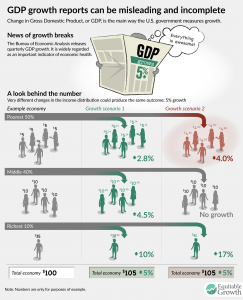
Image source: Equitable Growth
Here’s a Summary of the Criticisms
- There’s also not a correlation between GDP and the quality of public health. In 2013 scientists reported that largeimprovements in health The Center for Partnership Studies concluded that GDP may not be useful for the production of products and services that are useful to society, but instead may “actually encourage, rather than discourage, destructive activities.” In GDP medical breakthroughs, are measured solely by the price of the treatment, ignoring the benefits of shorter hospital stays and longer life expectancies that the treatments create.
- The Council of Economic Advisers itself shows that improvements in a country’s infrastructure such as water, plumbing and electricity provide a benefit well beyond their market prices but the social benefits are not measured with GDP.
- GDP doesn’t include negative effects on the environment. Many experts and observers have pointed out limitations of using GDP as an accurate measure of economic and social progress. For example, manyenvironmentalists argue that GDP does not take into account harm to the environment. In 2020 a group of scientists, as part of a World Scientists’ Warning to Humanity–associated series, issued a warning that measuring the growth of affluence in terms of GDP has promoted the use of natural resources and pollutant emissions among the affluent countries. They proposed a number of solutions that encompassed far-reaching lifestyle changes needed to complement technological advancements. They also cited that existing affluent economies’ continual expansion of consumption is not sustainable and the current model of capitalism founded on competitive market economies inhibits needed social change.
- GDP calculations is that it is ill-equipped to counterbalance the negative effects of natural disasters.Environmentalists argue that GDP actually incentivizes short-term growth at the expense of long-term global health because it does not take into account the value of things such as clean air and sustainable means of production. An example would be our continued use of fossil fuels and methods such as fracking. x
- GDP doesn’t include household production. GDP does not measure so-called household production, ignoring the free labor of mothers at home. The same logic applies to individuals who renovate their house rather than hiring a professional.
- GDP makes no adjustment for leisure time. For example, productivity is amongst the highest in the U.S., compared to some European countries, but the average American worker works more hours per week on average than the European counterparts.
- GDP did not adapt to technological changes to give a more accurate picture of the modern economy and does not encapsulate thevalue of things such as free information and entertainment on social media, according some observers such as Diane Coyle, an economist and former advisor to the UK Treasury.
- From GDP’s perspective, bigger is always better. That is not always so. When the financial sector became the dominant sector in the US economy, it ended in financial crisis for the world. Some observers say we are headed there
In the paper published in the Royal Society journal Philosophical Transactions of Biological Sciences, Professor Sir Partha Dasgupta argues that twentieth-century economics has been ‘inexplicably’ detached from the environmental sciences.“As long as we rely on GDP and HDI, we will continue to paint a misleading picture of economic performance,” he said.“If economists take into account natural capital, then it is clear that some of the world’s poorest people are subsidising the incomes of importer rich countries.”
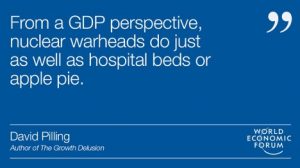
What are the Alternatives to Measuring GDP?
Catherine Rampell, writing in the New York Times, provides summary of the alternatives to GDP, including China’s “green GDP,” which measures environmental factors; the OECD’s “GDP alternatives,” which measures work-life balance; the“Index of Sustainable Economic Welfare,” which measures pollution costs and the distribution of income; and the“Genuine Progress Indicator,” which adds factors such as the value of household and volunteer work, and subtracts factors such as the costs of crime and pollution. Finally, here are more direct measures of well-being: the Happy Planet Index, Gross National Happiness and National Well-Being Accounts.
The Organization for Economic Cooperation and Development (OECD) also annually issues a report based on a study of 140 countries, indicating the levels of happiness in those countries. Notably, for at least the last decade, European countries such as Denmark, Finland, and the Netherlands and other countries such as Canada, Australia and New Zealand have ranked at the top and the U.S. has not made the top 10.
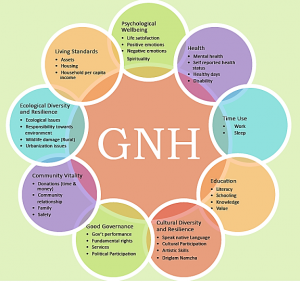
Image source: GNHCentre.org
Work-Life Balance
World experts on the subject of happiness, Dr. Ed Diener, Dr. Sonja Lyubomirsky and Dr. Martin Seligman, have concluded that beyond the basic level of necessities to support life, such as adequate, food, water, housing, happiness levels should be measured and include: meaningful close relationships; a positive, optimistic frame of mind; accepting responsibility for your life; being engaged in meaningful work; living in the present; and practicing an altruistic life, including gratitude, forgiveness and compassion.
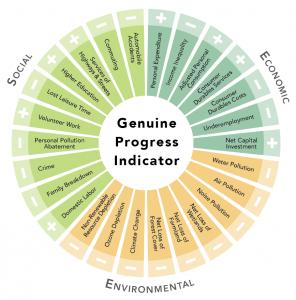
Image Source: gnhusa.org
While The U.S. Leads the World in GDP, it Falls Far Behind on Other Measures
If we look at broad and varied data other than GDP, the picture for the U.S. is not rosy. According to the U.N., the OECD, The Legatum Institute, The U.S. National Intelligence Council , the U.S. Congress, the CIA and many business publications:
- In 2008, the U.S. had fallen from first to third in global merchandise exports. The U.S. trails Japan for worldwide patent applications, with China soon to bypass both. In 2009, the Information Technology and Innovation Foundation reports that the U.S. ranks last among the 49 nations survey when it came to “change” in “global innovation-based competitiveness” in the last decade.
- After leading the world for decades in 25-34 year-olds with university degrees, the U.S. is now in 12 place. The World Economic Forum ranked the U.S. at 52nd among 139 nations in the quality of its university math and science instruction in 2010. According toe the OECD 15 year olds in the U.S. rank 17 in the world in science and 25 in math. The U.S. ranks 12 among developed countries in college graduation. And 79 in elementary-school enrollment. Nearly 50% of all graduate students in the sciences in the U.S. are foreigners, most of whom will be returning to their home countries.
- The Legatum Institute, a London-based research firm publishes an annual “prosperity index” and ranks the U.S. 9, five notches lower than last year. The U.S. poverty level is the third worst among advanced nations according to the OECD. Only Turkey and Mexico are worse. In the Legatum study, the U.S. ranks 27 for the health of its citizens; life expectancy is below average compared to 30 advanced countries measured by the OECD and obesity is the highest in the U.S. among all those countries.
- The U.S. federal government spending as a percentage of GDP is now up to about 36%. The Congressional Budget Office is projecting that U.S. government public debt will hit 716% of GDP by the year 2080.
- More than one quarter of the federal budget is spent on the military. The cost for the Iraq and Afghanistan wars is now creeping up to $10 trillion.
- The U.S. ranks 23 in the world in terms of infrastructure, well behind that of every other major advanced economy. The American Society of Civil Engineers prepared a report card on the state of America’s infrastructure-roads, bridges, dams etc. In the latest version the overall “GPA’ for the U.S. was a “D,” and the cost of bringing all systems up to adequacy, not an “A” was estimated at $2.2 trillion.
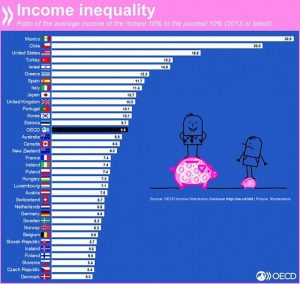
Image source: OECD
Income Inequality
In their book, The Spirit Level: Why Greater Equality Makes Societies Stronger, Professors Richard Wilkinson and Kate Pickett, present data taken from multiple credible sources that show the gap between the poor and rich the greatest in the U.S. among all developed nations; child well-being is the worst in the U.S. among all developed nations; and levels of trust among people in the U.S. among the worst of all developed nations. So income is helpful, but only in certain circumstances.”
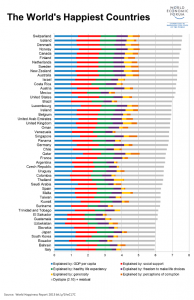
New Directions
The World Economic Forum has suggested revisions to the GDP in their report, Dashboard for a New Economy Towards a New Compass for the Post-COVID Recovery, which outlines a framework for macroeconomic metrics that could fill the gaps currently left by GDP.
This is part of WEF’s new compass for the post COVID-19 recovery.
Image Source: World Economic Forum
In its report, the Forum has proposed a scorecard made up of four dimensions that should be balanced: prosperity, the planet, people and the role of institutions.
Prosperity vs economic growth
The Forum’s ‘Prosperity’ metric includes income, as wealth inequality, social mobility, and financial resilience. In high-income economies, such as the U.S. it tracks slowing economic growth, its impact on standards of living and an increasingly unequal income distribution with a view to facilitating effective policy countermeasures.
In developing countries, the metric needs to account efforts to ending poverty. An example of this could be stimuli to boost the growth of clean energy over fossil fuels, the report says.
The ‘Planet’ metric integrates the use of various energy sources and, by association, the development of greenhouse gas emissions. This metric also accounts for the cost of climate change–for example through carbon taxes.
The dashboard’s ‘People’ dimension focuses on human capital for example, measuring education and re-skilling to guide government spending toward transforming workforce skill-sets and avoiding job losses as the economies restructure work for the future.
The final dimension is ‘Institutions’, with the Forum focusing on a decline in institutional quality, as reflected in things such as press freedom, judicial independence and budget transparency.
GDP’s inventor Simon Kuznets argued that his measure had nothing to do with well-being. But Western society’s embrace of free market capitalism has implied that well-being is the same thing as wealth. Rapid economic growth, such as we’ve witnessed in the U.S., as measured by GDP, has been considered a mark of success in its own right, rather than as a means to an end.
Kuznets wanted to subtract, rather than add, things he considered detrimental to human wellbeing, such as financial speculation and advertising and military weapons. GDP makes no distinction. From the perspective of global GDP, nuclear warheads have the same value as medical cures or apple pie.
Many politicians, economists and social scientists have been writing about and talking about the deficiencies in GDP for decades. They now believe we should measure the economic well-being of the families who make up the economy and not focus on GDP growth exclusively, according to a panel of high-profile economists, including Nobel Laureate Angus Deaton, titled “Beyond GDP,” held at the 2020 conference of the American Economic Association.
Economists Joseph E. Stiglitz, Amartya Sen, and Jean-Paul Fitoussi, entitled Mis-Measuring Our Lives summarized the problem in this line: “What we measure affects what we do.” GDP has encouraged countries, particularly the U.S., to emphasize “growing the pie,” based on the assumption that the pie is growing equally for all the people, which it hasn’t. Economic growth has mostly benefited the 1% even during the COVID-19 pandemic, while the majority of Americans, particularly the lower income groups, have not benefitted from any increase in GDP.
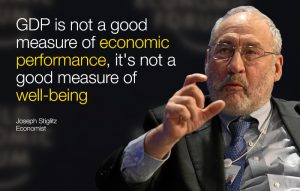
Image source: World Economic Forum
Experts are not warning U.S. lawmakers that without adding a distributional component to measurement of economic growth along with the measurement of GDP growth, the nation’s leaders will be half-blind when evaluating the overall economic health of the nation.
It’s time that we shelve GDP as a measure or our progress and replace it with something more realistic and beneficial.
Read my new book, available on Amazon:Toxic Bosses: Practical Wisdom for Developing Wise, Moral and Ethical Leaders, where I examine in detail the impact that toxic bosses have on employee well-being.
